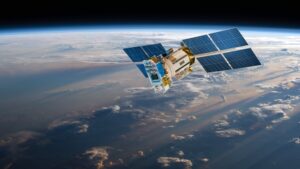A pioneering climate satellite designed to track methane emissions from space has gone missing, dealing a major blow to global efforts to curb one of the most potent greenhouse gases.
The $88 million MethaneSat satellite—developed by the Environmental Defense Fund (EDF) and backed by Google and Amazon founder Jeff Bezos—has lost contact with Earth just one year after launch. The EDF confirmed this week that communication with the spacecraft was lost ten days ago and is “likely not recoverable.”
Launched aboard a SpaceX rocket in 2023, MethaneSat was equipped with some of the world’s most advanced sensors designed to detect even low-level methane emissions. Its primary mission was to collect detailed, transparent data over a five-year period to help track leaks and releases from oil, gas, agriculture and landfill sites—sectors responsible for the bulk of global methane emissions.
Methane is 28 times more powerful than carbon dioxide over a 100-year period, making it a critical target for global climate mitigation efforts. Despite international pledges to cut methane emissions by 30% by 2030, global levels continue to rise year-on-year, with current satellite systems offering only partial or privately controlled visibility.
The loss of MethaneSat—one of the few methane-monitoring satellites with publicly accessible data—represents a significant setback for environmental scientists and regulators. EDF said the satellite had been a key part of efforts to “fill gaps between existing tools,” adding that some of the software used in the project may still be salvageable for future missions.
Google had been applying AI to MethaneSat’s data to build a global methane emissions map. The company hoped to boost transparency by highlighting “super-emitters” and harder-to-detect agricultural emissions, which are more diffuse than oil and gas leaks.
Experts suspect the satellite lost power, making recovery unlikely. EDF said an investigation is ongoing and it is too early to say whether a replacement mission will be launched. “To solve the climate challenge requires bold action and risk-taking,” the NGO said in a statement. “This satellite was at the leading edge of science, technology and advocacy.”
The loss comes at a time when other key methane-tracking tools are also nearing the end of their operational lives. The Sentinel-5P satellite operated by the European Space Agency, which hosts the TROPOMI instrument and supports the CarbonMapper project, was due to conclude its mission in October. While still operational, its future remains uncertain.
With rising emissions and limited means to track them in real time, environmental groups warn that losing access to high-quality data will hinder enforcement efforts and delay global action. Methane monitoring is seen as one of the most immediate and impactful ways to slow global warming.
The fate of MethaneSat now serves as a cautionary tale about the fragility of space-based climate tools—and a call to bolster global investments in next-generation environmental monitoring systems.
Read more:
$88m methane-tracking satellite lost in space, dealing major blow to climate monitoring

